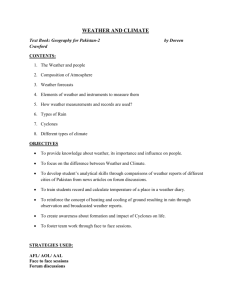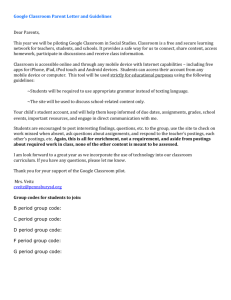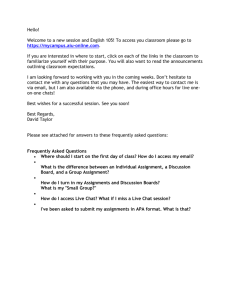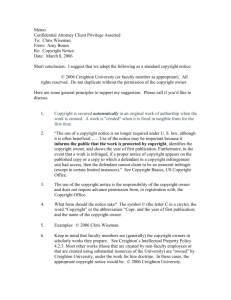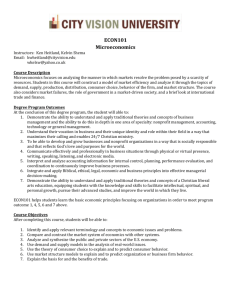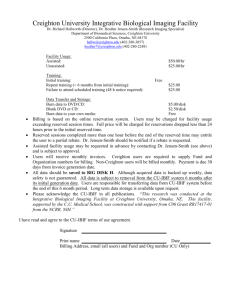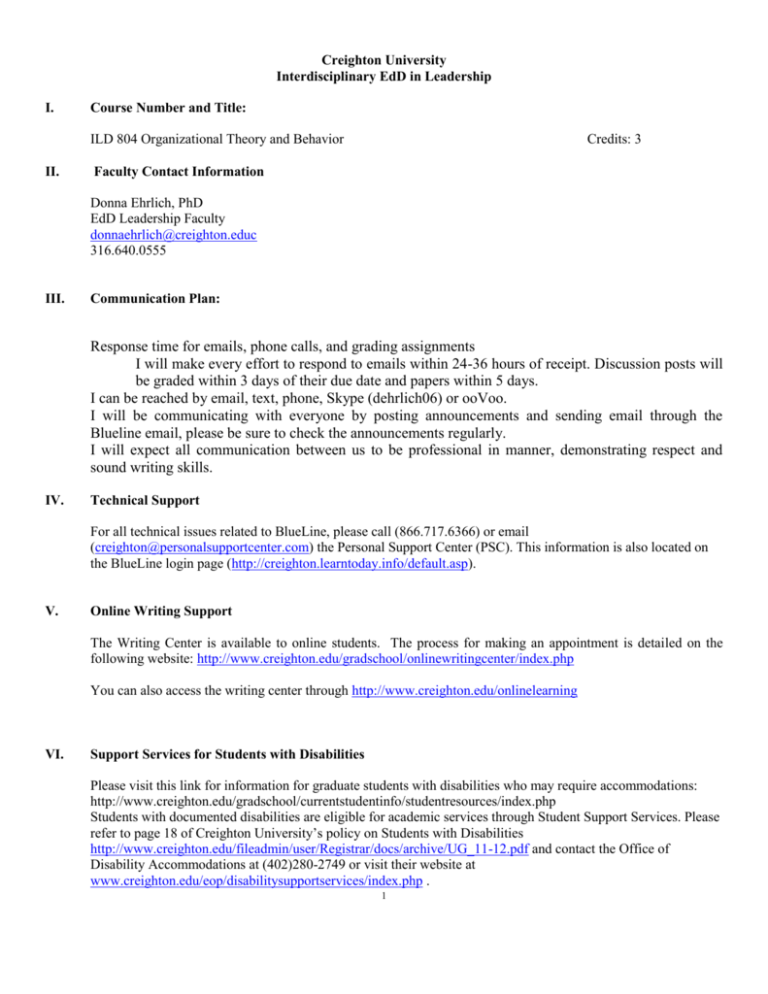
Creighton University
Interdisciplinary EdD in Leadership
I.
Course Number and Title:
ILD 804 Organizational Theory and Behavior
II.
Credits: 3
Faculty Contact Information
Donna Ehrlich, PhD
EdD Leadership Faculty
donnaehrlich@creighton.educ
316.640.0555
III.
Communication Plan:
Response time for emails, phone calls, and grading assignments
I will make every effort to respond to emails within 24-36 hours of receipt. Discussion posts will
be graded within 3 days of their due date and papers within 5 days.
I can be reached by email, text, phone, Skype (dehrlich06) or ooVoo.
I will be communicating with everyone by posting announcements and sending email through the
Blueline email, please be sure to check the announcements regularly.
I will expect all communication between us to be professional in manner, demonstrating respect and
sound writing skills.
IV.
Technical Support
For all technical issues related to BlueLine, please call (866.717.6366) or email
(creighton@personalsupportcenter.com) the Personal Support Center (PSC). This information is also located on
the BlueLine login page (http://creighton.learntoday.info/default.asp).
V.
Online Writing Support
The Writing Center is available to online students. The process for making an appointment is detailed on the
following website: http://www.creighton.edu/gradschool/onlinewritingcenter/index.php
You can also access the writing center through http://www.creighton.edu/onlinelearning
VI.
Support Services for Students with Disabilities
Please visit this link for information for graduate students with disabilities who may require accommodations:
http://www.creighton.edu/gradschool/currentstudentinfo/studentresources/index.php
Students with documented disabilities are eligible for academic services through Student Support Services. Please
refer to page 18 of Creighton University’s policy on Students with Disabilities
http://www.creighton.edu/fileadmin/user/Registrar/docs/archive/UG_11-12.pdf and contact the Office of
Disability Accommodations at (402)280-2749 or visit their website at
www.creighton.edu/eop/disabilitysupportservices/index.php .
1
If you have a disability that will require academic accommodations, you need to do both of the following as soon
as possible: 1) contact LuAnn Schwery (402) 280 2772 who will assist you in obtaining a letter verifying your
disability and the accommodations needed, and, 2) make an appointment with your instructor to review this letter
and discuss what reasonable accommodations can be made.
VII.
Course Rationale:
This is a required core course for students enrolled in the EdD in Leadership program. The expectation is that
students will apply the content of the course to their current working context, and the assignments are designed to
help ensure that.
VIII.
Relationship to Programmatic Themes:
a. Ignatian Values: Students are expected to enact magis in framing how they discern and accept
responsibilities associated with pursuing a clinical doctorate degree. In relationship to thinking about
structuring organizations and managing people to elicit desired behavior, students must see God in all persons
and select and enact appropriate practices that are just. This course provides foundational knowledge to
diagnose the current state of organizations and understand what could be changed to build better organizations
and ultimately, a better society.
b. Interdisciplinary Content: ILD 804 emphasizes theories, models, and concepts from the disciplines of
organizational theory and organizational behavior. These theories, models, and concepts can be implemented
in virtually all work contexts and settings. As such, you will be asked to apply course content to your current
work context and share your ideas and thoughts with your peers. From this interdisciplinary application, we
can learn from one another.
c. Dedication to Interdisciplinary Dialogue: Social construction of knowledge is a foundational perspective of
learning in this course, meaning that we can learn from one another, regardless of our work setting or context.
Therefore, in order to learn from one another, we must take on the responsibility of sharing, critiquing and
reflection on each other’s ideas. This dedication to social construction of knowledge is embodied in this
course by requiring participation discussion forums.
IX.
Course Description:
This course explores the most important theories and models that explain the attitudes and behaviors of individuals in
organizations. In the second half of the course, we will delve into organization theory to study the "behavior" of entire
organizations. The course opens with a brief review of leadership theories, and then covers critical topics from
organization theory and behavior, including such things as the relationship of environment and technology to organization
structure, organization culture, motivating followers, recognizing individual differences, influences on behavior in groups
and teams, and sources of individual and institutional power.
X.
Course Objectives:
On completing the course, students will:
1. Have examined theoretical and applied literature on organizational theory and organizational behavior.
(Program goal 3)
2. Be able to articulate the models, theories, and concepts that underlie many common management practices
and procedures (Program goals 3 and 4).
3. Be able to correctly diagnose causes underlying observed problems in cases and in real organization settings.
2
(Program goals 3, 4 and 5)
4. Be able to apply theories, models, and concepts to derive solutions, or create structures, policies, and
procedures that elicit desired results. (Program goals 4 and 5)
XI.
Teaching and Learning Methods
Critical Reading—Regular reading assignments are selected to explore the dimensions and ideal of leadership and
the ethical foundations that inform a leader’s personal and professional practices. Selected chapters,
articles, and reports are listed in the Course Schedule/Calendar.
Analytical Writing—Writing assignments are designed to facilitate students’ ongoing critical reflection and
application of the material to his or her own practice setting. There will be continued emphasis on
students’ development of skills in analysis and synthesis.
Project Development & Technology—Individually and in collaboration with fellow students, analyze problems,
develop and submit strategic plans and solutions, and interactively present and critique the synthesized
submissions
Dialog—Students will contribute regularly to forums designed to offer students opportunities to exchange ideas,
identify areas of consensus and disagreement among fellow students, and formulate substantive responses
and contributions to inquiry in the course.
Feedback—Students will receive regular feedback on their performance and progress throughout the course.
XII.
Student Expectations:
I will expect from the student the initiative to check into the classroom often, at least 3-5 times each
week, responding professionally in the discussion forum and participating in dialog with the faculty and
other classmates.
XIII. Internet Etiquette (Netiquette)
Netiquette is a set of rules and guidelines on how to behave in interactive discussion forums and email.
It is a combination of the words “Net” and “Etiquette”. While the rules of netiquette can and will
change over time and where they are being used, some simple common sense guidelines are generally
agreed on.
The primary rule to remember in all your communications online, via email or the discussion forums is
that the person on the other end is another human being. The anonymity of the internet can tempt one to
express themselves in ways they wouldn’t if the same conversation was face to face.
When having discussions with your classmates or instructors please be mindful that your conversation is
public and you should not disclose anything or say anything you would not say in a large public forum
or a classroom. You can also read more about netiquette from the following sites that go into more
detail about all forms of Internet communications.
Albion.com Core Rules of Netiquette http://www.albion.com/netiquette/corerules.html
Living Internet Netiquette Guidelines http://www.livinginternet.com/i/ia_nq.htm
XIV. University Academic Integrity Policies
Be particularly aware of the dangers of plagiarism. We expect that your written products are your own creation.
“Copying and pasting” others’ written work through any kind of internet search is a serious offense. If you have
questions here, I would be more than happy to discuss them. “Plagiarism” is the attempt to pass off other
peoples’ work (ideas, words, phrases or passages) as your own. Plagiarism is not acceptable regardless of which
writing style, format, guide or publication manual you may be using to complete an assignment. The penalty for
3
plagiarism can range from a grade of "F" on the assignment, paper or test, to a grade of "F" for the course and/or
dismissal from the University.
A student who engages in any of the following acts of academic or academic-related misconduct is subject to
disciplinary procedures and sanctions as determined by the school or college in which he or she is enrolled.
Academic or academic-related misconduct is defined to include but is not limited to:
1. Unauthorized collaboration or use of external information during examinations.
2. Plagiarizing or representing another’s ideas as one’s own.
3. Furnishing false academic information to the University.
4. Falsely obtaining, distributing, using, or receiving test materials.
5. Falsifying academic records.
6. Falsifying clinical reports or otherwise endangering the well-being of patients involved in the teaching process.
7. Misusing academic resources.
8. Defacing or tampering with library materials.
9. Obtaining or gaining unauthorized access to examinations or academic research materials.
10. Soliciting or offering unauthorized academic information or materials.
11. Improperly altering or inducing another to improperly alter any academic record.
12. Engaging in any conduct which is intended or reasonably likely to confer upon one’s self or another unfair
advantage or benefit respecting an academic matter.
The University Student Handbook can be found at:
http://www.creighton.edu/studentservices/centerforstudentintegrity/
XV.
Grading (overall course and individual assignments)
Grade
A
B
C
F
Grading Criteria (% of total points)
94-100
Superior performance in meeting course objectives
86-93
Excellent/good performance in meeting course objectives
78-85
Average performance in meeting course objectives
77 and below unsatisfactory performance
Course Grading Distribution
Discussion Post (8 weeks x 100 point/wk)
#1 Written Assignment – Dead Poets review
#2 Written Assignment – Case study 1
#3 Written Assignment - Case study 2
#4 Written Assignment – Article review
#5 Environmental Diagrams
#6 Structure Diagnosis & Diagrams
#7 Technology & Culture Diagnosis
#8 Final reflective essay
Total
Total Possible Points
800
100
100
100
100
100
100
100
100
1600
PAPER preparation: All papers are to be prepared following APA (American Psychological Association ) guidelines.
Papers are to be double-spaced, 1 inch margins, formatted and referenced according to APA guidelines. A quick
reference document for the APA style guide is on the course website or you may visit
http://owl.english.purdue.edu/owl/section/2/10/
Assignments
4
XVI. Prerequisites: Admission to program
XVII. Instructor of Record:
Donna Ehrlich, PhD
EdD Leadership Faculty
donnaehrlich@creighton.educ
316.640.0555
XVIII. Discussion and Writing Requirements. (see detailed assignment guidelines) (instructors reserve the right to
modify these as the course proceeds.)
*All Discussion Posts are due at 11:59 on Thursday’s. Papers are due at midnight on Sunday’s .
Late assignments will be accepted only if arranged with the instructor ahead of time, if an emergency does occur
please notify me immediately so arrangements can be made for submitting assignments. The class moves quickly
and it is important that all of us are actively involved to create a positive learning environment. This is our
opportunity to come together and spend time researching, reading and sharing what we are learning and applying
it to what we have and are experiencing.
XIX. Two Required Texts: (schedule details all readings by week)
Title: Organization Theory 2nd edition
Author: Mary Jo Hatch with Ann L. Cunliffe
Publisher: Oxford University Press
Title: Essentials of Organizational Behavior (11th Ed.)
Author: Stephen P. Robbins and Timothy A. Judge
Publisher: Pearson Prentice Hall
You need to watch the film Dead Poets Society, starring Robin Williams and directed by Peter Weir, during the first week
of class. You can order a DVD from Amazon.com, rent it from Netflix or other rental services, if you have the proper
equipment.
Your Harvard readings and cases need to be ordered directly from Harvard Business School Publishing using the link
below. There is a small fee for downloading the files needed.
http://harvardbusinessonline.hbsp.harvard.edu/relay.jhtml?name=cp&c=c62354
Journal articles that are not on the Harvard course site are on electronic reserve through the library. Please copy and paste
the link to access the files.
https://blueline.creighton.edu/section/default.asp?id=AS_AS_RAL_eReserves
Password: ILD804SPR
XX. SCHEDULE/ASSIGNMENTS
Course website URL: http://creighton.learntoday.info/default.asp
Discussion Post Guideline: (100 points per week) This course is designed to be a collaborative learning
community using discussion postings. Weekly Discussion Questions on topics relevant to the assigned course
5
topics will be assigned by the instructor, who will open the dialog by posting relevant questions or comments
intended to seek reflective comments by the teams. Active student participation in the class discussion with timely
postings in the forums are important to the pedagogy of this program. Students are to enter their 1st discussion
postings by 11:59 p.m. Thursday of each week. The discussion for each topic will close at 11:59 p.m. on Sunday
of each week. Students will be expected to contribute to the responses of at least two other classmates’ postings
each discussion. Discussion postings should be reasonably brief, e.g., approximately 250-500 words, and contain
original ideas and suggestions. Sources for posts should be briefly cited in the discussion forum. Use full
citations for other sources (APA format). Responses to other students’ posts should extend the conversation and
not merely offer a comment of agreement or a descriptive statement. For instance, question assumptions
underlying claims or offer additional questions for the group that will enhance learning. The faculty will actively
participate in the dialogs by providing feedback and answering and asking questions. The instructors will grade
each discussion posting by Wednesday of each week.
Letter
Grade
Total
Points
Earned On
Assignment
A
94-100
B
86-93
C
78-85
F
77 and
below
Description
Superior performance. Models professionalism and
exemplary intellectual engagement with the course content.
Demonstrates ability to productively identify sources of
conflict, tension, and disagreement in ways that motivate
and deepen inquiry in the course. Postings submitted on
time, allowing ample time for others to comment; two welldeveloped responses submitted to the postings of others.
Excellent/good performance. Consistently expresses an
open, attentive, collegial, caring demeanor. Offers
comments and questions to facilitate understanding, further
development, and clarification of fellow students’ points.
Postings submitted on time, allowing others to post
responses; follow up comments are brief and not leading to
additional learning..
Average performance. Inconsistent posting; comments lack
depth; oversimplifies the issues; and, postings are
submitted at last moments, allowing little or no time for
follow up discussion.
Unsatisfactory performance. Demonstrates untimely, noncollegial, unprofessional, disruptive, or otherwise rude
behavior. Attempts to silence or dominate others during
dialog. Offers comments that tend to close dialog or
interfere with exploration of an issue’s complexities or
ambiguities. Adopts an uncaring demeanor toward others.
6
Week 1: Answers to Questions Covering Leadership and Power as Evidenced in Dead Poets Society
Week 2: Answers to Questions Regarding the Alex Sander case
Week 3: Answers to Questions Covering Teamwork as Evidenced in The Army Crew Team Case
Week 4: Answers to Questions Covering Motivation & Feedback as Evidenced in the Article Selected
Week 5: Answers to Questions Covering Organizational Environment diagram and questions
Week 6: Answers to Questions Covering Organizational Structure diagram and questions
Week 7: Answers to Questions Covering Organizational Technology diagnosis and Cultural Diagnosis and
questions
These assignments will be graded using these criteria:
Letter
Grade
A
Total
Points
Earned On
Assignment
94 - 100
B
86 - 93
C
78 - 85
F
77 or fewer
Description
Superior performance. Questions are clearly answered by
applying models, theories, and concepts from the reading
assignments. Models, theories and concepts are clearly
understood and appropriately applied to analyze situations
and answer questions as required. Consistent use of APA
with minor errors. Answers are thorough while
parsimonious (that is, unnecessary “fluff” that elongates
but does not further elucidate is not present).
Excellent performance. A good attempt is made at
applying models, theories, and concepts from the reading
assignments. There may be evidence of an incomplete
understanding or misapplication of models, theories and
concepts in analyzing situations and answering questions
as required. Minimal use of APA. As always, answers
should be thorough while parsimonious (that is,
unnecessary “fluff” that elongates but does not further
elucidate is not present).
Average performance. Demonstrates minimal and
somewhat inconsistent responsiveness to assignment
requirements. There is lack of demonstration of completing
the assignment following the requirements. There is
inconsistent use f APA, which detracts from the overall
writing of the paper.
Unsatisfactory performance. Demonstrates poor ordering
or organization of ideas, inaccurate analysis and
application of theoretical concepts; weak referencing or
use of APA; demonstrates a lack of responsiveness to due
dates and times or failure to adhere to formatting criteria.
Week 8: Final Reflection Paper: This assignment is a final reflective paper. You will engage in a critical self7
reflective review of the course concepts and discuss how you relate these concepts to your personal experiences.
In this paper you will write about what you will take away from this course to again add to your “toolbox.” You
should be able to complete this assignment in at least 5 but not more than 7 pages.
Grading Rubric for Final Reflection Paper
Letter Grade
A
B
Total Points
Earned On
Assignment
Description
94 - 100
Superior performance. Compelling evidence of a critical look at self with
supporting recommendations for continued growth and professional
development; Well supported examples that link core concepts/ideas from
the course to own experience and development plan. Exemplary use of
APA format.
86 - 93
Excellent performance. Good evidence of a critical look at self with
supporting recommendations for continued growth and professional
development; Examples that link core concepts/ideas from the course to
own experience and development plan. Consistent use of APA but includes
a number of errors.
C
78 - 85
F
77 or fewer
Average performance. Demonstrates minimal and somewhat inconsistent
responsiveness to assignment requirements. Very little self-reflection is
demonstrated and limited personal experiences are discussed.
Inconsistent use of APA, which detracts from the overall writing of the
paper.
Unsatisfactory performance. Demonstrates poor ordering or organization
of ideas, inaccurate analysis and application of theoretical concepts; weak
referencing or use of APA; demonstrates a lack of responsiveness to due
dates and times or failure to adhere to formatting criteria.
Topic
Assignments:
Readings/Discussion Forums/Written Work
01
Leadership: Substance, Style and
the Wielding of Power
Watch “Dead Poets Society”
Read Chapters 11 and 12 in Robbins and Judge
Read Gabarro, J. J. & Kotter, J. P. (1980). Managing Your Boss
Harvard Business Review
Read “Inside the Coup at Nike” from BusinessWeek from the
electronic reserve through the library
Submit the answers to the assignment about the movie to the drop box
and post interesting comments in the discussion forum
02
Understanding People by
Themselves
Read Chapters 2 and 4 in Robbins and Judge
Case Study 1 – Greiner, L. E. & Collins, (2008). A Day in the Life of
Alex Sander Harvard Business Review
Submit answers to the assignment to the drop box regarding case
Week
8
study 1 and post interesting comments in the discussion forum
03
Understanding People You
Thought You Understood (until a
group got a hold of them)
Read Chapters 8 & 9 in Robbins and Judge
Case Study 2 – Snook, S. & Polzer, J. T., (2004). The Army Crew
Team Harvard Business Review
Submit the assignment to the drop box regarding case study 2 and post
interesting comments in the discussion forum
Getting People to Do What You
Want
Read Chapter 6 and 7 in Robbins and Judge
Article review – Select one of the following articles found on the
electronic reserve through the library:
Liou, S. (2008). An Analysis of the Concept of Organizational
Commitment (healthcare)
or
Bardon, T. & Josserand, E. (2009). Why do we play the games:
Exploring institutional and political motivations (education)
Submit answers to the assignment to the drop box regarding the
articles and post interesting comments in the discussion forum
Organizational Environments
Read Chapter 3 in Hatch and Cunliffe
Diagram Your Organization’s Environment
Submit answers to the assignment to the drop box and post interesting
comments in the discussion forum
Organization Structure
Read Chapter 4 in Hatch and Cunliffe
Diagnose Your Organization’s Structure; Reflect on EnvironmentStructure Match (or not)
Submit answers to the assignment to the drop box and post interesting
comments in the discussion forum
07
When is Technology NOT
Technology and Putting Weeks 5,
6 & 7 Together and Organization
Culture
Read Chapter 5 & 6 in Hatch and Cunliffe
Read Organizational Dynamics “Getting Value from Shared Values”
(McDonald & Gandz) from the library on electronic reserve.
Diagnose Your Organization’s Culture and Your Organization’s
Technology; Reflect on Environment, Structure & Technology
Matches (or not)
Submit answers to the assignment to the drop box and post interesting
comments in the discussion forum
08
Congruence & Strategic
Alignment
Final reflection paper
Submit answers to the assignment to the drop box and post interesting
comments in the discussion forum
04
05
06
OVERVIEW TABLE OF WRITTEN ASSIGNMENTS:
Week 1
Week 2
Week 3
Week 4
Assignment
Assignment Assignment
Assignment #2: Case
#3: Case
#4: Article
# 1: “Dead
study review Study
Review
Plan to pace yourself…..
Week 5
Week 6
Assignment
Assignment
#5: Diagram
#6:
the
Diagnose
9
Week 7
Assignment
#7:
Diagnose
Week 8
Assignment
#8 – Final
Self-
Poets
Society
Dialog
Forum
#1:
Leadership
styles and
leading
from the
middle.
Along with
power and
politics
review
Dialog Forum
#2 Attitudes
and
assessments,
understanding
people.
Dialog
Forum
#3: Group
behaviors,
how to lead
organization
environment
Dialog
Forum
#4:
Applying
theories of
motivation
in an
organization
your
your
organization organization
structure
culture and
technology
Dialog Forum Dialog
Dialog
#5: Aligning
Forum
Forum
your
#6: Share
#7: Discuss
organization
your
your
for the future; analysis of
organization
understanding your
culture and
the
organization technology,
environment. structure
reflecting on
how it
impacts the
organization
overall.
WEEKLY Discussion postings
Community of learners dialogue
10
Reflective
Essay
Dialog
Forum #8:
Reflective
discussion
about your
learning
experience.

